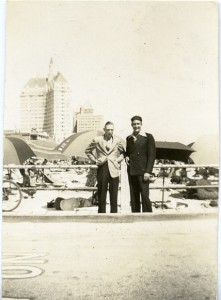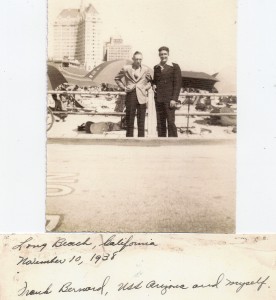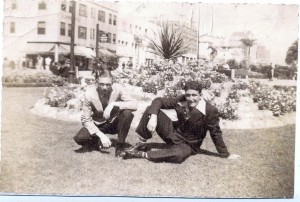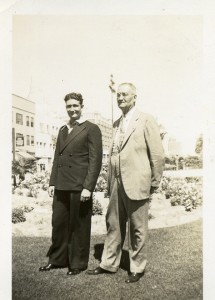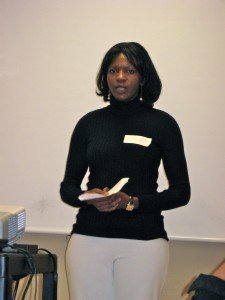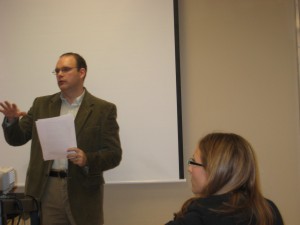December 7, 1941, my Uncle Frank Bernard was minding his own business on the USS Arizona, berthed at Pearl Harbor, HI. Without doubt he was awake at the time a Japanese bomb destroyed his ship and snuffed out his life. 1176 shipmates also died that day. Frank was definitely at the wrong place at the wrong time. Every year on this date, no doubt today as well, I will see a photo or a film clip of the Arizona blowing up.
I am the only one of my siblings old enough to have ever actually met Uncle Frank; the last time at the end of June, 1941, in Long Beach, California.

Bernard Family Reunion at Long Beach CA late June, 1941. Frank is in the center, Dick, 1 1/2, is next to him.
Frank had served on the Arizona since 1936. Though he seems to have been engaged to someone in Bremerton WA, he likely intended to be a career man in the Navy.
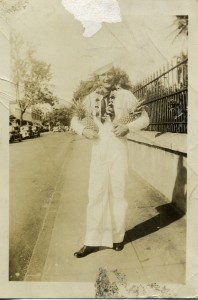
Frank Bernard, Honolulu, some time before Dec. 7, 1941
Wars are never fought without reasons, or consequences. They are collections of stories, often mythology masquerading as fact. One war succeeds the last war. That’s just how wars are.
Frank’s Dad, my Grandpa Henry Bernard, 43 years earlier had enlisted to serve the United States in what he always called the Spanish-American War in the Philippines. He was very proud of this service, which lasted from the spring of 1898, to the summer of 1899. The pretext for this war was the explosion of the USS Maine in Havana harbor. Whatever actually caused the explosion was blamed on the Spaniards, and led to an outpouring of patriotic fervor in the U.S. “Remember the Maine” was the battle cry.
Grandpa’s unit, one of the first to the Philippines, never actually fought any Spaniards – he and his comrades were hardly off the boat near Manila when the Spanish surrendered. His battles were with the Filipino “insurgents” who were glad to be rid of the Spaniards, and just wanted the Americans to go back where they came from. That war is now called the Philippine-American War – a term Grandpa wouldn’t know.
In Henry’ company was his future wife’s cousin, Alfred Collette. Some years after the war, Alfred returned to the Philippines, becoming successful, later marrying and living the rest of his life in the Philippines.
After Pearl Harbor, the first major conquest of American territory by the Japanese was the Philippines…. Alfred was imprisoned at the notorious Santo Tomas. During the final battle for the liberation of Manila in 1945 his second child, named for my grandmother Josephine, was killed by shrapnel from either the liberators or the Japanese. She was only four years old, in her mother’s arms. Her two siblings witnessed her death.
Seven of Uncle Frank’s cousins in Canada, all from the same family, went to WWII, three in the Canadian Army, four in the U.S. Army. One of the seven died in combat. Others from my families served as well, as did neighbors. Most survived; some didn’t.
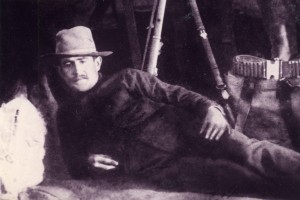
Alfred Collette, 1898, Presidio San Franciso CA
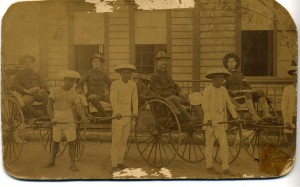
Henry Bernard, middle soldier, in Yokahoma Japan, enroute home1899
Which brings to mind the USS New York LPD 21.
On Thanksgiving day came one of those power point forwards celebrating the launch of the Amphibious Transport Ship the USS New York, a ship partially manufactured out of the wreckage of the World Trade Centers September 11, 2001. The internet is awash with items about this ship, commissioned in November of 2009.
A key caption of the powerpoint said that the New York’s contingent was “360 sailors, 700 combat ready Marines to be delivered ashore by helicopters and assault craft”, apparently roaming the world at the ready to do battle with the bad guys wherever they were. The transport has “twin towers” smokestacks,
I could see the attempt at symbolism in the power point: “don’t mess with the U.S.”. The boat plays to the American fantasy that we are an exceptional society, more deserving than others.
But, somehow, I failed to see the positive significance of this lonely boat, roaming the world, looking for opportunities to do battle against our enemies.
It doesn’t take a whole lot of geographic knowledge to know how immense this world is, and how tiny and truly insignificant is a single ship with about 1000 U.S. servicemen, no matter how highly trained and well-equipped they might be.
It seems we have better ways to use our money.
Uncle Frank was technically a peace-time casualty – War wasn’t declared against Japan until after he was dead. He and his comrades at Pearl Harbor who also died were only the first of hundreds of thousands of Americans, who joined, ultimately, millions of others who became casualties of WWII. A few of Grandpa Henry’s comrades were killed on Luzon, and till the end of his life in 1957 in Grafton ND there was an annual remembrance at the monument in front of the Walsh County Court House.
The triumph of war is what we seem to remember.
The horror of war is what we best “never forget”.
Peace takes work, lots of it. Let’s work for Peace.
